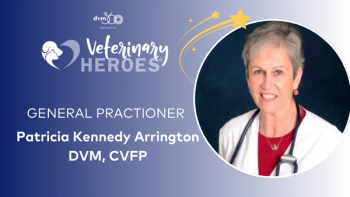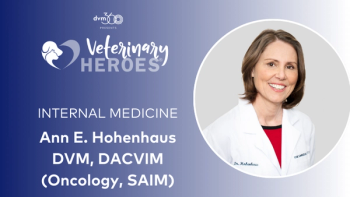
The profession of no return
With high debt and low salaries, investing in a veterinary education has a poor return on investment.
Getty ImagesRon and Junior joke around quietly in the small café as they wait for Aaron to join their regular Tuesday lunch. Ron is parts manager at a local Chevrolet dealer, while Junior teaches and coaches girls' basketball at the local high school. Aaron is the CEO at the local hospital. The three men are buddies who go way back.
Ron looks at his watch. “Twelve minutes past noon-Aaron's right on time.” Just then their friend appears with a frazzled look.
“What's up, Mister Big?” Junior asks with a grin.
“Same stuff as usual,” Aaron replies. “Things are fair. Molly's home from veterinary school. She finished up this year and has a pretty good job about an hour from here.”
“Congrats!” Ron and Junior say, loud enough to turn heads at the diner.
The waitress takes their orders and the boys begin to jaw. Finally, Aaron speaks half under his breath: “The only problem is that Molly has about $180,000 in student loans.”
“That shouldn't be a problem in the long run. Vets make a lot of money,” says Ron. Junior nods.
Aaron exhales slowly. “She'll be working as an equine vet starting out at $47,000 a year. She has to pay $1,350 per month on her loan starting next January,” he says.
Ron and Junior don't say much more during lunch. Aaron has to leave early for a board meeting.
After Aaron leaves, Ron looks at Junior. “You know my youngest daughter, Sandi, has an associate's degree. She was making that much when she started as an x-ray technician working at Aaron's hospital.”
Consider the investment
The American Veterinary Medical Association (AVMA) has finally made it official, confirming what a lot of veterinarians suspected all along-veterinary medicine from a financial standpoint is not a good investment. This is the dramatic conclusion from the Veterinary Economics Division of the AVMA. The article “Estimating the financial return on a veterinary education,” which appeared in the Feb. 15 issue of JAVMA, is a shocker.1
Using standard financial calculations of net present value-the value of something today amortized into the future-and return on investment, the article shows clearly that veterinary medicine, especially in the private clinical sector, has little or no return financially when you take into account the huge investment in time, money and loss of wages during veterinary school. What makes matters worse is that the average data is skewed due to the fact the veterinarians in industry make significantly more income (and benefits) than the poor veterinarians slugging it out in the trenches.
So what makes us do it? Well, as the article points out, there's more to a profession than making a living. The non-utilitarian aspects of our job are powerful: working with and helping animals and their owners is very appealing indeed. This is what attracts most people to our profession in the first place. In fact, the pull of veterinary school is so strong that most aspiring veterinarians won't let anything get in their way until they reach their goal. Money in the form of loans is simply Monopoly money-that is, until the day of reckoning when the bills are due and there's not enough money left at the end of the paycheck.
The word may be getting out. Enrollment is not down, but the number of qualified applicants who apply to veterinary school is falling. This trend is not confined to veterinary medicine. The cost of all graduate school education has been climbing at a rapid rate since 2008, and other medical professions are definitely feeling the heat.
Most professional students in other medical fields have similar loan commitments. The salvation for them is that they're “subsidized” during their future professional careers at some level by federal dollars through federally mandated programs and insurance. Thus salaries and benefits continue to rise for these professions. On the other hand, dentists and veterinarians receive very little in the way of insurance and federal support.
Return on investment
The return on investment problem has to do with low veterinary salaries during the course of a long career. The average veterinary income across all segments and all age groups is $98,000 per year. The following professions currently outperform veterinary medicine: podiatrists ($137,000), pharmacists ($118,000), optometrists ($113,000) and, finally, dentists ($166,000) per year.2
Like veterinarians, dentists rely very little on insurance. Unlike veterinarians, they make their income on procedures and are not afraid to charge for them. This is something veterinary medicine has never learned to do. Despite the best efforts of economists and consultants for the past 20 years, the profession is caught in a constant game of financial catch-up that has reached critical mass. The debt-to-income ratio continues to rise at an untenable rate.3
This AVMA study reveals another crack in the foundation of wonderful but reeling profession. Unless we charge appropriately for medical and surgical advances that properly reflect the reality of our training and investment, our young graduates may be doomed to fall out of the middle class altogether.
References
1. Ross Knippenberg, Michael R. Dicks, Bridgette Bain, Michael Dow. Estimating the financial return on a veterinary education. J Am Vet Med Assoc, 2015; 246.
2. Bureau of Labor Statistics. May 2014 National Occupational Employment and Wage Estimates United States. www.bls.gov/oes/current/oes_nat.htm#29-0000
3. Mike Dicks, PhD. Truth or trash? Examiming debt-to-income ratios for new veterinarians. dvm360 magazine, 2015; 46, 3. veterinarynews.dvm360.com/debt-income-ratios-flawed-measure-veterinary-earning-potential.
Dr. David Lane owns and manages
two practices in southern Illinois. He has a master's degree in agricultural economics and is a consultant, speaker and author of numerous practice-management articles. He can be reached at davidlane1948@yahoo.com.
Newsletter
From exam room tips to practice management insights, get trusted veterinary news delivered straight to your inbox—subscribe to dvm360.




